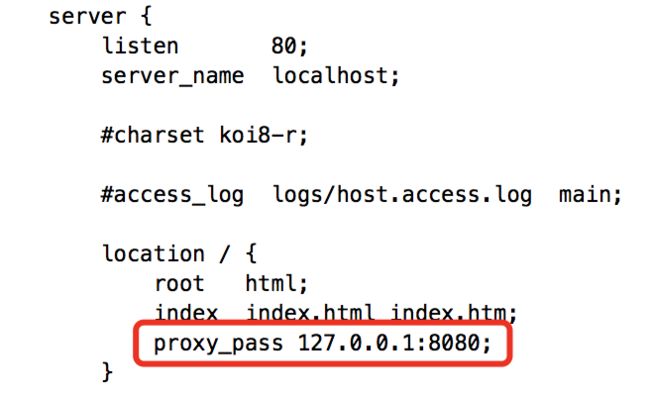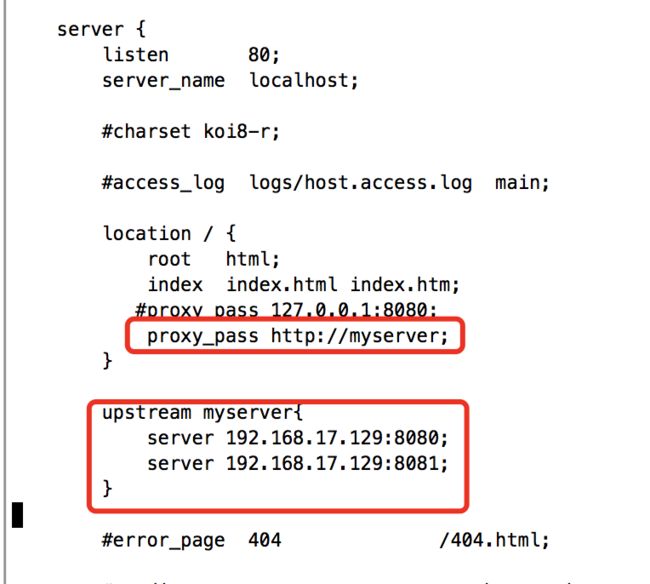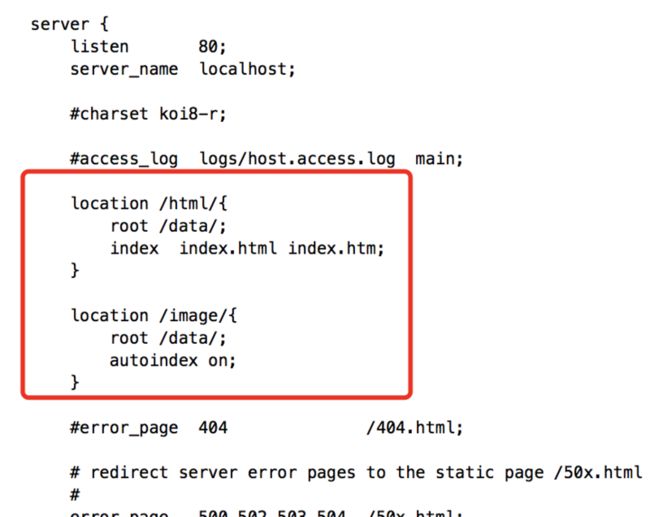什么是Nginx
Nginx是高性能的HTTP和反向代理的服务器,处理高并发能力是十分强大的,能经受高负载的考验,有报告表明能支持高达 50,000 个并发连接数
Nginx作用
1.反向代理
a.正向代理
需要在客户端(浏览器)配置代理服务器,通过代理服务器进行互联网访问
b.反向代理
其实客户端对代理是无感知的,因为客户端不需要任何配置就可以访问,我们只 需要将请求发送到反向代理服务器,由反向代理服务器去选择目标服务器获取数据后,在返 回给客户端,此时反向代理服务器和目标服务器对外就是一个服务器,暴露的是代理服务器 地址,隐藏了真实服务器 IP 地址。
2.负载均衡
单个服务器解决不了,增加服务器的数量,然后将请求分发到各个服务器上,将原先请求集中到单个Nginx服务器上的 情况改为将请求分发到多个服务器上,将负载分发到不同的服务器,也就是我们所说的负载均衡![1KFFR~4T@6U]F{`WK%8Z{AM.png Nginx 快速入门学习笔记_第3张图片](http://img.e-com-net.com/image/info9/85bf49f55f534673ae8de14a7346d85b.jpg)
3.动静分离
为了加快网站的解析速度,可以把动态页面和静态页面由不同的服务器来解析,加快解析速度。降低原来单个服务器的压力。
nginx安装
nginx常用命令
1.使用nginx命令前提条件:必须进入nginx录/usr/local/nginx/sbin
2.查看nginx版本号
./nginx -v
3.启动nginx
./nginx
4.关闭nginx
./nginx -s stop
5.重新加载nginx
./nginx -s reload
nginx配置文件
vi /usr/local/nginx/conf/nginx.conf
#user nobody;
worker_processes 1;
#error_log logs/error.log;
#error_log logs/error.log notice;
#error_log logs/error.log info;
#pid logs/nginx.pid;
events {
worker_connections 1024;
}
http {
include mime.types;
default_type application/octet-stream;
#log_format main '$remote_addr - $remote_user [$time_local] "$request" '
# '$status $body_bytes_sent "$http_referer" '
# '"$http_user_agent" "$http_x_forwarded_for"';
#access_log logs/access.log main;
sendfile on;
#tcp_nopush on;
#keepalive_timeout 0;
keepalive_timeout 65;
#gzip on;
server {
listen 80;
server_name 192.168.148.131;
#charset koi8-r;
#access_log logs/host.access.log main;
location /html/{
root /data/;
index index.html index.htm;
}
location /image/{
root /data/;
autoindex on;
}
#error_page 404 /404.html;
# redirect server error pages to the static page /50x.html
#
error_page 500 502 503 504 /50x.html;
location = /50x.html {
root html;
}
# proxy the PHP scripts to Apache listening on 127.0.0.1:80
#
#location ~ \.php$ {
# proxy_pass http://127.0.0.1;
#}
# pass the PHP scripts to FastCGI server listening on 127.0.0.1:9000
#
#location ~ \.php$ {
# root html;
# fastcgi_pass 127.0.0.1:9000;
# fastcgi_index index.php;
# fastcgi_param SCRIPT_FILENAME /scripts$fastcgi_script_name;
# include fastcgi_params;
#}
# deny access to .htaccess files, if Apache's document root
# concurs with nginx's one
#
#location ~ /\.ht {
# deny all;
#}
}
# another virtual host using mix of IP-, name-, and port-based configuration
#
#server {
# listen 8000;
# listen somename:8080;
# server_name somename alias another.alias;
# location / {
# root html;
# index index.html index.htm;
# }
#}
# HTTPS server
#
#server {
# listen 443 ssl;
# server_name localhost;
# ssl_certificate cert.pem;
# ssl_certificate_key cert.key;
# ssl_session_cache shared:SSL:1m;
# ssl_session_timeout 5m;
# ssl_ciphers HIGH:!aNULL:!MD5;
# ssl_prefer_server_ciphers on;
# location / {
# root html;
# index index.html index.htm;
# }
#}
}nginx由三部分组成
1.全局块
从配置文件开始到 events 块之间的内容,主要会设置一些影响nginx 服务器整体运行的配置指令,主要包括配 置运行 Nginx 服务器的用户(组)、允许生成的 worker process 数,进程 PID 存放路径、日志存放路径和类型以 及配置文件的引入等。
比如上面第一行配置的
worker_processes 1;这是 Nginx 服务器并发处理服务的关键配置,worker_processes 值越大,可以支持的并发处理量也越多,但是 会受到硬件、软件等设备的制约
2.event块
如:
events {
worker_connections 1024;
}events 块涉及的指令主要影响 Nginx 服务器与用户的网络连接,常用的设置包括是否开启对多 work process 下的网络连接进行序列化,是否允许同时接收多个网络连接,选取哪种事件驱动模型来处理连接请求,每个 word process 可以同时支持的最大连接数等。
上述例子就表示每个 work process 支持的最大连接数为 1024。
3.http块
http {
include mime.types;
default_type application/octet-stream;
sendfile on;
server {
listen 80;
server_name 192.168.148.131;
location /html/{
root /data/;
index index.html index.htm;
}
location /image/{
root /data/;
autoindex on;
}
error_page 500 502 503 504 /50x.html;
location = /50x.html {
root html;
}
}这算是 Nginx 服务器配置中最频繁的部分,代理、缓存和日志定义等绝大多数功能和第三方模块的配置都在这里。
需要注意的是:http 块也可以包括 http全局块、server 块
a.http全局块
http全局块配置的指令包括文件引入、MIME-TYPE 定义、日志自定义、连接超时时间、单链接请求数上限等。
b.server 块
这块和虚拟主机有密切关系,虚拟主机从用户角度看,和一台独立的硬件主机是完全一样的,该技术的产生是为了 节省互联网服务器硬件成本。
每个 http 块可以包括多个 server 块,而每个 server 块就相当于一个虚拟主机。而每个 server 块也分为全局 server 块,以及可以同时包含多个 locaton 块。
<1> 全局 server 块
最常见的配置是本虚拟机主机的监听配置和本虚拟主机的名称或IP配置。
<2> location 块
一个 server 块可以配置多个 location 块。 这块的主要作用是基于 Nginx服务器接收到的请求字符串(例如 server_name/uri-string),对虚拟主机名称 (也可以是IP 别名)之外的字符串(例如 前面的 /uri-string)进行匹配,对特定的请求进行处理。地址定向、数据缓 存和应答控制等功能,还有许多第三方模块的配置也在这里进行
Nginx反向代理实现
1.启动一台8080端口tomcat
2.
3.访问ip则反向代理到tomcat启动页
Nginx负载均衡实现
1.启动8080端口,8081端口tomcat,webapps目录下放两个同名不同内容的html文件假设为test.html
2.
3.ip/test.html轮询访问两个tomcat页面
Nginx动静分离实现
访问tomcat的请求为动态请求,访问前端页面为静态请求,使用location将两种请求分离开来
1.在liunx系统中准备前端页面静态资源,用于进行访问
/root/data/html/test.html
/root/data/image/test.png
2.
3.ip/html/test.html访问 ip/image/test.png访问
Nginx高可用实现
1.准备两台服务器,都安装nginx,keepalived
2.修改两台服务器/etc/keepalived/keepalivec.conf配置文件
global_defs {
notification_email {
[email protected]
[email protected]
[email protected]
}
notification_email_from [email protected]
smtp_server 192.168.17.129
smtp_connect_timeout 30
router_id LVS_DEVEL
}
vrrp_script chk_http_port {
script "/usr/local/src/nginx_check.sh"
interval 2 #(检测脚本执行的间隔)
weight 2
}
vrrp_instance VI_1 { state BACKUP # 备份服务器上将 MASTER 改为 BACKUP interface ens33 //网卡 virtual_router_id 51 # 主、备机的 virtual_router_id 必须相同 priority 90 # 主、备机取不同的优先级,主机值较大,备份机值较小
advert_int 1
authentication {
auth_type PASS
auth_pass 1111
}
virtual_ipaddress { 192.168.17.50 // VRRP H 虚拟地址
}
} 3.在/usr/local/src添加检测脚本
#!/bin/bash
A=`ps -C nginx –no-header |wc -l`
if [ $A -eq 0 ];then
/usr/local/nginx/sbin/nginx
sleep 2
if [ `ps -C nginx --no-header |wc -l` -eq 0 ];then
killall keepalived
fi
fi4.两台服务器都启动nginx,keepalived
5.停止主服务器nginx,keepalived,再访问nginx